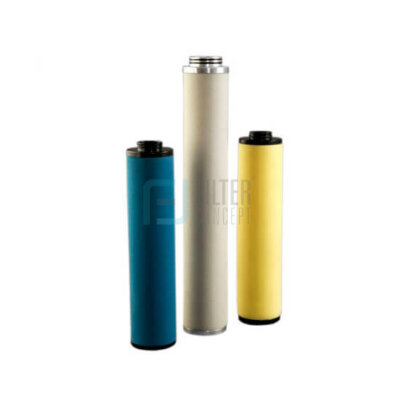Compressed air filters are crucial components in many industrial and commercial settings, ensuring that the air used in machinery and tools is clean and free from contaminants. Proper maintenance of these filters is essential to avoid operational issues and costly repairs. This article will explore common problems with compressed air filters and provide practical solutions to address these issues effectively.

Understanding Compressed Air Filters
What is a Compressed Air Filter?
A compressed air filter is designed to remove impurities from compressed air. These impurities can include dust, dirt, oil, and water. The filter’s primary function is to ensure that the compressed air remains clean and effective for use in various applications.
How Compressed Air Filters Work
Compressed air filters work by trapping contaminants as the air passes through the filter media. The media, often made of materials like paper, polyester, or fiberglass, captures particles and moisture, allowing clean air to flow through. Filters are usually classified into different types based on their filtration capabilities, such as particulate filters, coalescing filters, and adsorption filters.
Common Compressed Air Filter Problems
Clogged Filters
One of the most common issues with compressed air filters is clogging. Over time, the filter media becomes saturated with contaminants, reducing airflow and efficiency. This can lead to increased energy consumption and decreased performance of the air system.
Oil Contamination
Oil contamination occurs when oil from the compressor mixes with the compressed air. This can cause problems such as reduced filter efficiency and damage to downstream equipment. Regular checks and proper maintenance can help prevent oil contamination.
Excessive Pressure Drop
An excessive pressure drop across the filter indicates that the filter is becoming blocked or is not functioning correctly. This can cause the compressor to work harder, leading to increased energy costs and potential system failure.
Unusual Noise
Unusual noises, such as whistling or rattling, can signal that the filter is malfunctioning or that there is an issue with the filter housing. This can affect the overall performance of the air system and should be investigated promptly.
Leaks and Damage
Leaks and physical damage to the filter can compromise its effectiveness. Regular inspections can help identify leaks or cracks in the filter casing, which can lead to contamination of the compressed air.
Simple Solutions to Filter Problems
Regular Maintenance
Performing regular maintenance on compressed air filters is crucial for preventing problems. This includes scheduled inspections, cleaning, and timely replacement of filters. Following the manufacturer’s recommendations for maintenance can prolong the filter’s lifespan and ensure optimal performance.
Cleaning and Replacement
Cleaning filters can help restore their efficiency. However, in many cases, replacing the filter is a more effective solution, especially if the filter is heavily contaminated or damaged. Always use filters that meet the specifications of your air system.
Proper Installation and Setup
Ensuring that filters are installed correctly is essential for their proper functioning. Incorrect installation can lead to issues such as leaks and reduced efficiency. Follow the installation guidelines provided by the manufacturer to avoid common pitfalls.
Monitoring and Diagnostics
Implementing monitoring and diagnostic tools can help detect problems with filters early. Pressure gauges, flow meters, and other diagnostic tools can provide valuable insights into the performance of the filter and the air system.
Expert Insights
Insights from Industry Professionals
Industry professionals often emphasize the importance of regular maintenance and timely replacement of filters to prevent issues. According to experts, a proactive approach to filter management can significantly reduce downtime and maintenance costs.
Case Study: Filter Maintenance in Industrial Settings
In a case study conducted in a large manufacturing facility, implementing a comprehensive filter maintenance program led to a 30% reduction in equipment failures and a 20% decrease in energy consumption. This highlights the impact of effective filter management on operational efficiency.
Future Outlook and Practical Applications
Emerging Technologies
Advancements in filter technology, such as the development of self-cleaning filters and enhanced filtration materials, are expected to improve filter performance and reduce maintenance requirements. Staying updated on these developments can help organizations make informed decisions about their air filtration systems.
Best Practices for Long-Term Performance
Adopting best practices for filter maintenance, such as regular inspections, proper installation, and using high-quality filters, can ensure long-term performance and reliability of the air system. Investing in advanced monitoring tools can further enhance filter management.
Conclusion
Compressed air filters play a vital role in maintaining the efficiency and longevity of air systems. By understanding common filter problems and implementing simple solutions, organizations can prevent issues and optimize their air filtration systems. Regular maintenance, proper installation, and monitoring are key to ensuring that compressed air filters perform effectively and reliably. read more..
Frequently Asked Questions (FAQ)
What is the lifespan of a compressed air filter?
The lifespan of a compressed air filter varies depending on factors such as the type of filter, operating conditions, and maintenance practices. Generally, filters should be inspected regularly and replaced according to the manufacturer’s recommendations.
How often should air filters be replaced?
Air filters should be replaced based on their condition and usage. Regular inspections and monitoring can help determine the optimal replacement schedule. On average, filters should be checked every 3-6 months.
Can a clogged filter damage my equipment?
Yes, a clogged filter can cause increased pressure drop and reduced airflow, leading to potential damage to equipment and higher energy consumption. Timely replacement or cleaning of the filter can prevent such issues.
How can I prevent oil contamination in my filters?
To prevent oil contamination, ensure that the compressor and air system are properly maintained. Regularly check and replace oil separators and use high-quality filters designed to handle oil contamination.
What are the signs that a filter needs to be cleaned?
Signs that a filter needs cleaning include reduced airflow, increased pressure drop, unusual noises, and visible dirt or debris on the filter. Regular monitoring can help identify when cleaning is necessary.